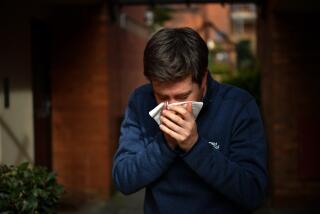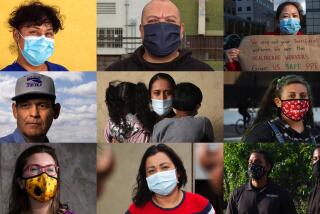Public health comes into play when sick days aren’t paid
- Share via
Paid sick time has long been considered an economic issue, not a health issue. But public health is directly affected when employees go to work while sick.
“Many public-health people are concerned about the implications of having so many workers without paid sick days,” says Dr. Rajiv Bhatia, director of occupational and environmental health for the San Francisco Department of Public Health. “The communication of disease affects everyone. But public-health people typically aren’t invited to participate in these conversations.”
Advocates of paid sick days say such policies save money in the long run by allowing workers to take better care of themselves and avoid sickening others. A 1996 study in the American Journal of Epidemiology found that the incidence of disease in the workplace is reduced when workers have paid sick days. Another study found that a worker with the flu is likely to infect almost two of every 10 co-workers.
“It’s funny to me that we have such a focus on health insurance and healthcare access and we haven’t thought through how people can stay home when they’re sick,” says Bhatia, also a clinical assistant professor of medicine at UC San Francisco. “It’s like we haven’t thought through this no-brainer.”
State health regulations require that children receive a number of immunizations before enrolling in school and that they stay home from school or day care for 24 hours after having a fever. But a lack of paid sick days for parents makes such guidelines impractical, and parents may send their children to school even if they’re still contagious, Bhatia says.
“Often women with children have fewer paid sick days than average,” he says. “Why wouldn’t we, as a society, make sure women with children have adequate paid sick days? These are key contradictions.”
The lack of paid sick time among workers who are in direct contact with the public is most worrisome, Bhatia says. For example, in California, ill restaurant workers are prohibited from coming to work. Many do, however, because they don’t have paid time off. An estimated 85% of the nation’s restaurant workers lack paid sick days, according to federal labor statistics.
“We have a public-health law that is practically unenforceable because we don’t have a complementary labor law that enforces it,” Bhatia says.
A stunning number of people who work in healthcare settings also lack paid sick time -- as many as 75% of all home health aides, for example, according to Bhatia. Federal data indicate that as many as 29% of all workers in the “healthcare and social assistance” job sector lack paid sick days. Healthcare employees who work while ill may end up hurting the people they are hired to help. Patients in healthcare settings are especially prone to contagious diseases.
Kwanna Anderson is a full-time security guard at a Los Angeles hospital. The hospital provides paid sick days to its workers. But Anderson’s employer, a security company that contracts with the hospital, does not provide paid sick time. Anderson has five vacation days per year, but those days have to be scheduled in advance and cannot be used for sudden healthcare needs.
A single mother of three children, Anderson, 31, says she has spent many days at work sick and many other days at work worrying about a sick child. Although she often works in close proximity to patients, she says her supervisor discourages her from taking even unpaid sick time.
“They say, ‘We don’t have anyone to cover for you,’ ” Anderson says. “Since I’ve been working there, I’ve had the flu twice. Both times I went to work. Fever, cough, congested, can’t breathe. Regardless, I have to go to work.”
Health researchers have erred in not examining the effect of paid sick days on public health, Bhatia says. He is heading a study due out this summer that will examine the health impact of San Francisco’s law requiring employers to provide an hour of paid sick leave to any worker for every 30 hours worked.
Proponents such as Vicky Lovell, director of employment and work/life programs for the Institute for Women’s Policy Research in Washington, D.C, admit there are no data on whether paid sick days reduce a company’s healthcare costs over time. But common sense suggests that it’s the right thing to do.
“Most people think paid sick days seem so reasonable,” she says. “We want people to be able to take care of themselves or their family without losing their jobs or taking time off without pay.”





